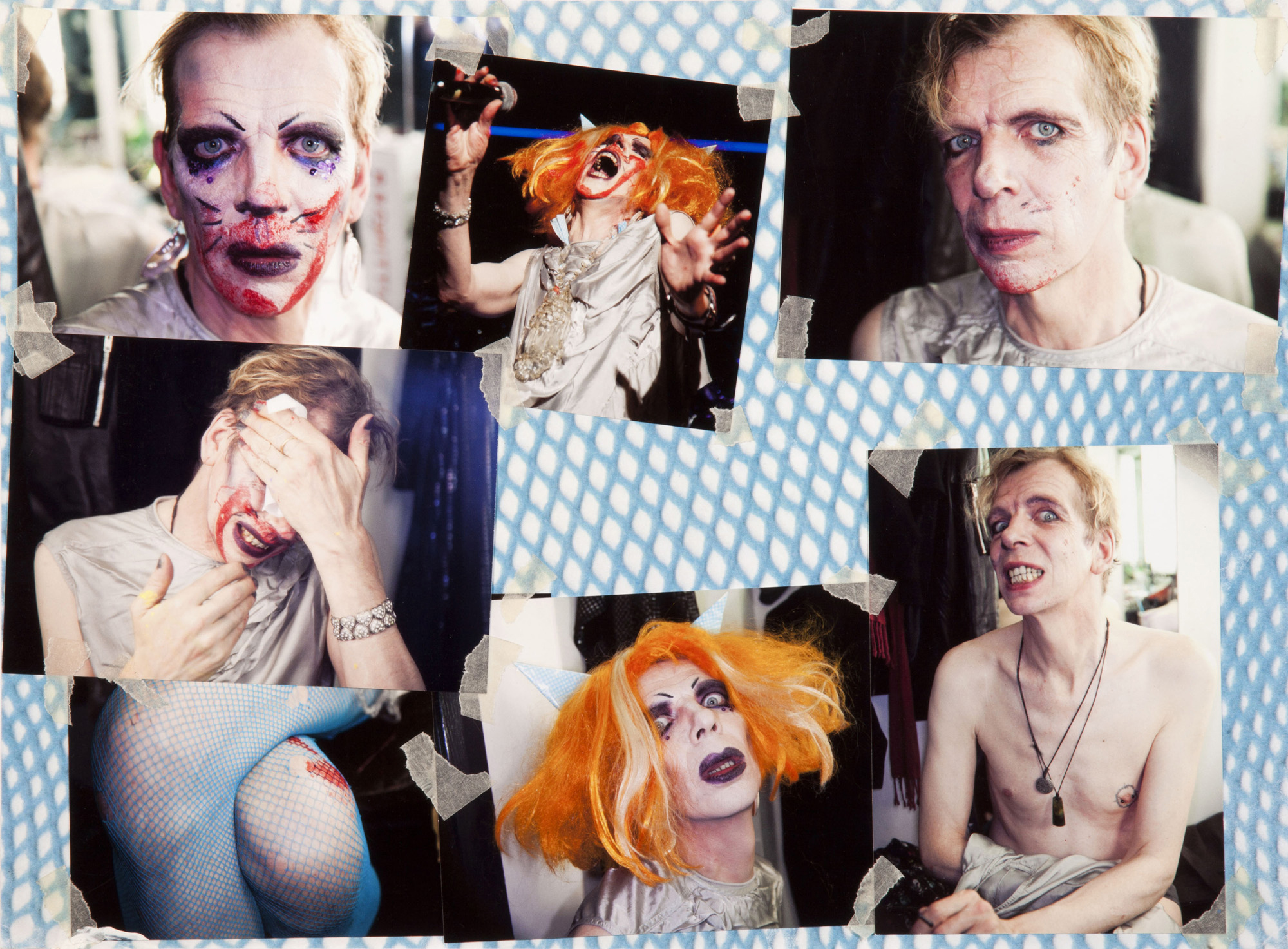Understanding David Hoyle, Britain's finest avant-garde anti-drag queen
- Text by Biju Belinky
- Photography by Holly Revell

David Hoyle is a force to be reckoned with. Not just because of the unrelenting energy brought to every stage he steps on, but mostly for his ability to turn pain into power in a way that’s seamless – so bare and honest that it can make even the uninitiated uncomfortable.
Standing in front of an audience with a face smudged in makeup that will only get messier throughout the evening, Hoyle sports his signature look that goes miles past gender – anti-drag, it’s called – a form of organised chaos bringing together a subversion of preconceived ideas of femininity, a touch of surrealism, and a strong distaste for all that is binary and bourgeois.
Dragging his words with a piercing stare, Hoyle has been using performance to discuss complex subjects since the 1990s, addressing class, homophobia, materialism, racism, nationalism and trauma with a scathing mix of well-researched humour and unwavering intensity.
Outside of his persona, David is soft-spoken and relatively subdued, but still extremely honest and upfront. On stage and off, the Blackpool-born artist speaks openly about having been bullied to the point of a mental breakdown at the age of fourteen, as well as his relationship with mental health, drugs, self-harm and alcohol.
His honesty and unapologetic approach to queerness led him to become an unmatched icon in the British LGBTQ scene. An outsider among the outsiders, David’s life as an artist has been through various phases, going from BBC-level fame through a self-imposed hiatus and back to the stages of legendary LGBTQ London venues, never losing his energy on the way.
Above all, David’s life shows that, for him, being an artist isn’t an occupation, but a necessity – it’s second nature.
It’s this dichotomy and complex history that photographer and friend Holly Revell is looking to immortalise in print. Featuring images taken over the past eight years, collages of memorabilia from performances and previously unseen artworks, David Hoyle: Parallel Universe promises to be not only a biography, but also a documentation of the experience of a performance – going from preparation to the height of adrenaline onstage and back to reality.
You can help David Hoyle: Parallel Universe become a reality through Kickstarter.
Enjoyed this article? Like Huck on Facebook or follow us on Twitter.
Latest on Huck

In the ’60s and ’70s, Greenwich Village was the musical heart of New York
Talkin’ Greenwich Village — Author David Browne’s new book takes readers into the neighbourhood’s creative heyday, where a generation of artists and poets including Bob Dylan, Billie Holliday and Dave Van Ronk cut their teeth.
Written by: Cyna Mirzai

How Labour Activism changed the landscape of post-war USA
American Job — A new exhibition revisits over 70 years of working class solidarity and struggle, its radical legacy, and the central role of photography throughout.
Written by: Miss Rosen

Analogue Appreciation: Emma-Jean Thackray
Weirdo — In an ever more digital, online world, we ask our favourite artists about their most cherished pieces of physical culture. Today, multi-instrumentalist and Brownswood affiliate Emma-Jean Thackray.
Written by: Emma-Jean Thackray

Meet the shop cats of Hong Kong’s Sheung Wan district
Feline good — Traditionally adopted to keep away rats from expensive produce, the feline guardians have become part of the central neighbourhood’s fabric. Erica’s online series captures the local celebrities.
Written by: Isaac Muk

How trans rights activism and sex workers’ solidarity emerged in the ’70s and ’80s
Shoulder to Shoulder — In this extract from writer Jake Hall’s new book, which deep dives into the history of queer activism and coalition, they explore how anti-TERF and anti-SWERF campaigning developed from the same cloth.
Written by: Jake Hall

A behind the scenes look at the atomic wedgie community
Stretched out — Benjamin Fredrickson’s new project and photobook ‘Wedgies’ queers a time-old bullying act by exploring its erotic, extreme potential.
Written by: Isaac Muk




